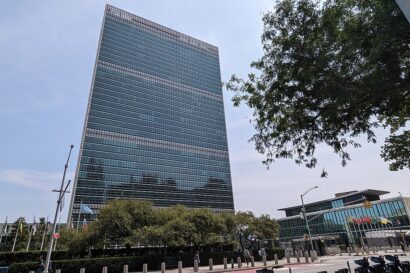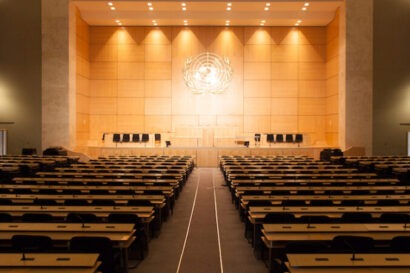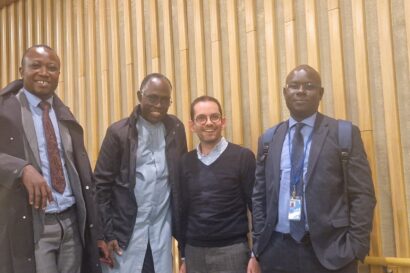Professor Sol Picciotto recently wrote an article which responds to a paper I wrote on the question of what is meant by “illicit financial flows” (IFFs) and in particular whether tax avoidance and tax planning by multinational enterprises should be included in the concept.
As a reader of the ICTD website it is likely that you, like Professor Picciotto, are a member of “team tax”; someone who would answer the question ‘is taxation interesting and important?’ with ‘hell, yeah!’. I also count myself as a member of this team. We are also members of “team development”; concerned with advancing prosperity, equity and peace. Beyond that, we are members of “team research”; we seek to make a contribution to the common good through developing and testing ideas, including through robust, collegiate debate.
It is in this spirit that I am responding to Professor Picciotto’s article.
The question of defining IFFs has become particularly salient in relation to the Sustainable Development Goals, where they are included as a target. As members of “team tax” you may be inclined towards the argument that tax avoidance is, or should be, included under this target, since to exclude it might suggest that it is not important. But the question of whether taxation is important is not the same as whether tax avoidance really belongs under the IFF umbrella.
Collecting tax is not the only challenge to building capable states. Public institutions can get stuck in persistent failure, driven by a mismatch between capacity and expectations, playing out as corruption and ineffective public services. In this environment crooked and corruptible businesses crowd out those that won’t or can’t play that game. ‘Violent entrepreneurs’, strongmen and organised crime fill the gap in state capability. The billions of dollars looted by leaders from national treasuries represents only a fraction of the damage done.
Rich countries have belated recognised that they have a moral obligation to halt the flow of criminal and corrupt money into their financial institutions and property markets, and to combat bribery by their companies abroad. States now have legal duties to screen, trace, freeze, seize and return illicit wealth, and to detect, prevent and punish foreign bribery.
To understand progress and challenges we need clear concepts and a common language; enforcement relies on sharing information between the private sector and law enforcement, between tax and customs authorities, financial intelligence units and criminal investigators, and between jurisdictions. This depends on cooperation and a precise legal framework – for example, about the circumstances in which citizens’ information can be shared. The idea of combining legal and illegal activity into a vaguely defined but politically powerful category makes me deeply nervous.
If tax avoidance really does not fit into a conception of illicit finance which is recognisable to people across all of these domains, then any tactical ‘win’ that might come from melding it into the definition comes at the expense of a loss of clarity and ability to communicate. As Professor Picciotto notes in his article, and I agree, widespread conflation of the terms transfer pricing, transfer mispricing, and trade misinvoicing has already led to a high degree of confusion in the narrative about illicit financial flows.
There are three approaches we can take to considering the robustness and usefulness of different proposed definitions, to get closer to a common understanding:
- First is to observe how people are already using the term; what working definitions are already in practical use and what do people mean when they say ‘illicit finance’?
- Second is to consider the conceptual coherence of the phenomena that might be captured under different definitions; to what extent are they the same or different?
- Third we might argue instrumentally that a particular definition should be adopted because the consequences would be beneficial to our higher-level goals.
What do people mean when they say “illicit finance”?
The most common working definitions of illicit financial flows, used by organisations including the African Tax Administrators Forum, the OECD and the World Bank, concern financial transfers related to illegal activity. The US based NGO Global Financial Integrity (GFI) which invented and popularised the term say it was intended as a synonym for ‘dirty money’, and their formulation “funds crossing borders [that] are illegally earned, transferred, and/or utilized” is often used. Within the SDGs, reducing illicit financial flows forms part of a target that also includes combatting trade in illicit arms, theft of public assets and organised crime, suggesting the drafters were also thinking about ‘dirty money’.
This definition covers behaviours such as money laundering to hide the proceeds of crime and illicit trade, embezzlement and corruption; fraud; sanction busting; channelling funds towards criminal destinations, such as bribery or terrorism; cross-border tax evasion; and capital flight in disobedience with currency controls. It includes both cases that have been brought to court, and broader estimates of undetected flows. For example, the UK National Crime Agency estimates that money laundering connected to the UK amounts to more than are GBP 90 billion a year.
Professor Piciotto argues that the term should extend to a wider set of potentially unlawful and immoral activities, and in particular tax avoidance and tax planning by multinational corporations. This is also argued by the Tax Justice Network (where he is a senior advisor), for example in a letter to the UN Secretary General they say that the definition of illicit financial flows already “clearly covers tax avoidance by multinational companies” and that “no amount of reinterpretation or redefinition can raise any legitimate question over this point”.
In practice however when people use the term illicit finance they almost always mean “dirty money” (apart from where transfer pricing and ‘trade misinvoicing’ get confused). This is true whether the term is being used by governments, international organisations, NGOs or academics. For example the UK government describes the aim for its Anti-Money Laundering and Counter-Financing of Terrorism regime as “making the UK financial system a hostile environment for illicit finances”. The US Treasury addresses similar issues under ‘Terrorism and Illicit Finance’. Transparency International’s position paper on illicit financial flows also frames it in similar terms. The Tax Justice Network itself has used it in this way. For example a letter to G20 Leaders in 2014 argued “As long as there are places in the global financial system where illicit financial flows can find a safe harbour and there are people to help hide these funds there will be millions more around the world who suffer…The UN estimates that global detection rates of illicit funds by law enforcement are as low as 1 per cent. However, there are common-sense ways to make it harder for criminals to hide the proceeds of their crimes”
In contrast, when people talk about issues in international corporate taxation they rarely use the term illicit. For example the word does not appear at all in the Base Erosion and Profit Shifting (BEPS) Action Plan. Nor does it appear in the extensive technical analysis and commentary by the BEPS Monitoring Group led by Professor Picciotto, nor in his ICTD Working paper Is the International Tax System Fit for Purpose, Especially for Developing Countries? In fact it barely features in ICTD’s working papers and blog posts. Illicit financial flows get a brief mention in the International Commission for Reform of the International Corporate Taxation’s declaration (“We also support important efforts to curb illicit financial flows”) but not at all in their most recent Roadmap to Improve Rules for Taxing Multinationals. ‘Illicitness’ is just not a core concept in these debates.
Is the proposed broader definition of illicit financial flows conceptually coherent?
Of course definitions, particularly of novel and contested concepts can evolve. There could be a case for expanding the illicit finance definition, to cover activities that are similar in nature but excluded from the narrower definition.
This is the argument that Professor Picciotto makes, saying that the lines between illegal, unlawful and immoral practices are fuzzy and therefore that the three categories should be bundled together under a single definition. He argues that tax avoidance should be considered illicit because it “can be challenged by tax authorities and may be found unlawful”. Furthermore he argues that activities that are not currently unlawful but deemed to be immoral or against the public interest should also be included. In an article from 2015 on the High Level Panel on Illict Financial Flows from Africa he sets out this argument clearly – saying that the definition of avoidance (and therefore IFF) should not be limited to behaviour which might be termed ‘aggressive tax practices’ or ‘abusive transfer pricing’. “Rather it should cover MNCs employing “standard practices, which are not only allowed but encouraged by current international tax rules”.
This broad definition bundles fundamentally different types of behaviour together. For example the ‘dirty money’ conception of illicit flows already covers cases such as these:
- Payments of bribes by multinational companies such as Siemens and Griffiths Energy.
- Financial institutions enabling tax evasion such as a Swiss Banker squeezing diamonds into tubes of toothpaste to help a client transfer assets without detection.
- Money laundering through international banks such as drug cartels using HSBC and the role of British Banks in harbouring assets stolen from the Nigerian state by James Ibori.
- Money laundering by front companies such as football clubs used for money laundering by the Russian mafia.
- Tax fraud such as carousel and missing trader VAT fraud, and cases such as that of the British hedge fund manager Sanjay Shah under investigation, alleged to have defrauded €1.65 billion.
- Illicit trade in tobacco and alcohol to evade duties and tax often carried at large-scale by organised crime groups, working under cover of apparently legitimate businesses.
Many of these examples involve seeking to disguise illegal transfers as legitimate business transactions, for example, in the Seimens case fake invoices and contracts were used to disguise bribe payments. The Russian mafia-owned football clubs misprice sales of players between (undeclared) related entities. Carousel fraud involve rings of traders exchanging high value goods such as of cell phones, computer chips and precious metals (or more recently carbon credits and wholesale phone credit), charging VAT and then absconding with the payment. Not every company in the ring will realise they are part of a fraud. Illicit tobacco traders mask the nature of the goods being transported by using cover loads of legal products, switching the identifying markers on containers and simple misdeclaration.
Professor Picciotto gives examples of the type of behaviour that would be included under the proposed wider definition such as the “Double Irish Dutch sandwich”, and the international tax structures of Apple, Nike, Whirlpool and Starbucks. He also argues that any disagreement or adjustment to transfer prices indicates an attempted illicit flow (relevant examples would be the disputes about the arms-length price for the services of Rio Tinto and BHP Billiton’s Singapore marketing hubs).
While both sets of cases can involve legal uncertainty, tax questions and multinational corporations they seem fundamentally different. The first set involve hiding or misdeclaring the nature of a transaction or a relationship to evade detection by law enforcement, while the second set involve taking advantage of the tax rules of different countries. As the original OECD BEPS report describes “While there clearly is a tax compliance aspect [..] there is a more fundamental policy issue: the international common principles drawn from national experiences to share tax jurisdiction may not have kept pace with the changing business environment”. While it is true that there is legal indeterminacy in applying tax laws; both in terms of complex structures, and in determining acceptable arms-length prices, these uncertainties do not form a continuous grey area which overlaps, or even closely abuts, the behaviours of bribery, fraud, theft of public assets, tax fraud and evasion and money laundering. As Annet Ogutu of the University of South Africa and the Davis Tax Commission says, in an ICTD Working Paper “Equating BEPS to illicit financial flows fosters confusion in understanding international tax principles, and in finding solutions to the problem of capital flight… the legal solutions to resolving licit BEPS issues are different from those required to resolve illicit financial flows. Curtailing BEPS requires reforming the international tax system and coming up with anti-tax avoidance measures – whereas curtailing illicit financial flows requires criminal sanctions”.
Professor Piciotto argues that the different behaviours should be included together under the illicit flows definition “since they all use the offshore tax haven and secrecy system”. However this seems like tautological reasoning. People seeking to evade law enforcement hide their activities. The fact that illicit finances use the same legal structures and financial channels as other international transactions and investment flows, is precisely the problem that anti-money laundering seeks to control.
Should we adopt a broad definition of illicit financial flows?
The proposed broad definition brackets the behaviours that are compliant with current tax laws with tax evasion, grand corruption and fraud. I have argued that does not represent a conceptually coherent set, and it does not reflect what people currently understand by the term illicit.
Nevertheless one might argue that the broad approach should be adopted, in pursuit of higher level goals. For example tactically, if the aim is to mobilise political and public opinion for tax reform then presenting corporate tax planning as on par with tax evasion and grand corruption might be seen as helpful framing. However, equally this tactic may be used by those who benefit from corruption to draw attention away.
The instrumental reason that Professor Picciotto gives for adopting the broad definition is that it would support “efforts to remove the justifications advanced for using offshore structures”. He argues that “since the international drive against money-laundering and terrorist financing, most of the offshore financial centres have clamped down on criminality, aiming to hold themselves out as clean and safe, while dragging their feet on measures to defeat tax avoidance”.
This seems to suggest that the problem of money laundering is largely solved, and that attention should shift elsewhere. In practice while anti-money laundering regulations have been remarkably successful in achieving international uptake, they have had much less success at preventing and returning criminal and corrupt funds. There is still much to be done. A recent report by the Centre for Financial Crime and Security Studies at RUSI examined the role of professional services providers in the UK, such as accountants, lawyers, estate agents and company formation agents as preventers, or enablers of illicit flows. They argue that more effective screening depends on better dialogue and closer cooperation between the public and private sectors, and a more nuanced approach to addressing the spectrum of behaviours; from proactive compliance, to innocent involvement, to negligence to complicity.
Promoting ‘illicit flows’ as a blanket label to remove justification for using offshore structures, is the opposite of the approach taken by anti-money laundering, where the aim is to distinguish between legitimate flows of finance and illegitimate ones.
It is understandable that people in “team tax” may be more focused on tax avoidance than anti-money laundering or grand corruption. But we should not allow our enthusiasm for the cause of international tax policy reform to get swept up into a narrative which bundles together a large swathe of international investment, finance and professional services as being ‘by definition’ on the same side as drug cartels, kleptocrats and money launderers. This is unlikely to lead to better dialogue and cooperation. The definition of illicit financial flows should be recognisable to those working to combat organised crime, tax evasion and tax crime, money laundering and corruption. We are all part of “team rule of law” with a common interest in the integrity of financial and fiscal systems.




